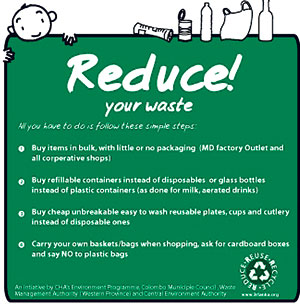Garbage. It’s one of life’s unpleasant realities. It’s unsightly and it usually stinks.
Most people are quite content to bid goodbye to their waste at the earliest opportunity, not thinking where it all goes. Follow the circling crows or alternately your nose, in Colombo city and you will probably be led to a shocking reality – the Bloemendhal garbage dump for one, which brings home the reality that all of our household waste, has to end up somewhere.
It is this kind of realization, combined with a long-overdue appreciation for the destructive impact that human societies are having on the global environment that has brought the topic of solid waste management to the forefront. Of all the issues associated with garbage, reducing the amount of garbage that we produce is the most effective solution to the problem of its disposal.
The hard reality is that we are now generating more garbage than the system can handle, so while the municipal governments must do something to address this issue, citizens are also responsible for creating solutions. Reducing the waste that we put out for collection correspondingly reduces the amount of waste that needs to be dumped. Fortunately the waste generated in Sri Lanka is still primarily organic and therefore can be disposed of by turning it into compost. However it is non-organic waste that takes ages to decompose and ensures that garbage piles up instead of breaking down. If we separate and reduce the amount of non-organic waste that gets put out on garbage collection day then there will be less garbage to sully our surroundings.
 |
| The first of the three Rs: Part of an awareness campaign |
In an effort to reduce the amount of waste that is being collected from householders by the Municipal Councils, the Waste Management Authority (W.P.), Colombo Municipal Council (CMC) and Central Environment Authority (CEA) initiated an official recycling programme. They have designated a series of locations, colourfully designed and clearly marked where separated recyclable wastes such as paper, glass, polythene, plastic and metals can be dropped off.
The Consortium of Humanitarian Agencies Environment Programme has also launched a waste management public awareness initiative with the hopes of getting as many households, offices and schools to start following and continue with the 3R (Reduce, Reuse, Recycle) Way. The CHA is available for any information, questions and advice requests that the public may have.
A well-run recycling programme is cheaper to operate than waste collection and dumping, which is just one of the many benefits inherent in recycling. The first thing that we all need to do is reduce what we consume. This means thinking hard about what we really need and the costs to the planet now and in the future, of acquiring more than we need.
Reducing means not purchasing as much from the shop, living in a smaller home that still suits our requirements, opening the windows in the evening instead of relying on air conditioning and unplugging appliances overnight or when they are not in use. It seems like common sense but it is amazing how we all get used to living a certain way and can easily be convinced (often through effective advertising) that we require more than we really do.
Reducing what we consume goes hand in hand with the second best option, re-using what we already have.
We all need to make an effort to minimize our waste by reducing what we consume, reusing what we already have and collecting plastic, paper, cardboard, glass and tin for recycling. Sri Lanka already has most of these notions in-built - eg. the ‘bothal-pathera’ man, milk bottle return, re-cycled paper kade bags, scrap collectors. Alternately, it is often possible to find a place that will take your recycled waste and even pay you for it. This kind of action and effort will ensure that we all tread just a little more lightly on the planet that we all share.
Contact The Environment Programme, CHA; Tel: 011461093/4
Email: environmentofficer@cha.lk
Web: www.humanitarian-srilanka.org, www.3rlanka.org
Quick facts and figures
For every ton of paper that gets recycled, 17 trees don’t have to be cut down; every glass bottle recycled saves the energy equivalent to burning a light bulb for four hours; recycling one ton of steel saves 2500 pounds of iron ore, 1400 pounds of coal and 120 pounds of limestone and eliminates the ecological degradation that accompanies extraction; and recycling aluminum saves 95% of the energy it takes to make it from new materials.
Getting the maximum use
- Instead of throwing away take-away containers, wash them and use them to store food or other items.
- Before getting rid of an old shirt or skirt, think about giving it to someone else or adding something to it to – or even taking something away, like long sleeves on a shirt - to make it fresh and fun again.
- Old plastic bottles can be made into mosquito traps or bird feeders, old magazines and newspapers can be great raw material for kids’ art projects (as can many other items that usually get tossed straight in the bin).
- Water is easy to re-use. Pouring the children’s bath water on the plants!
|

